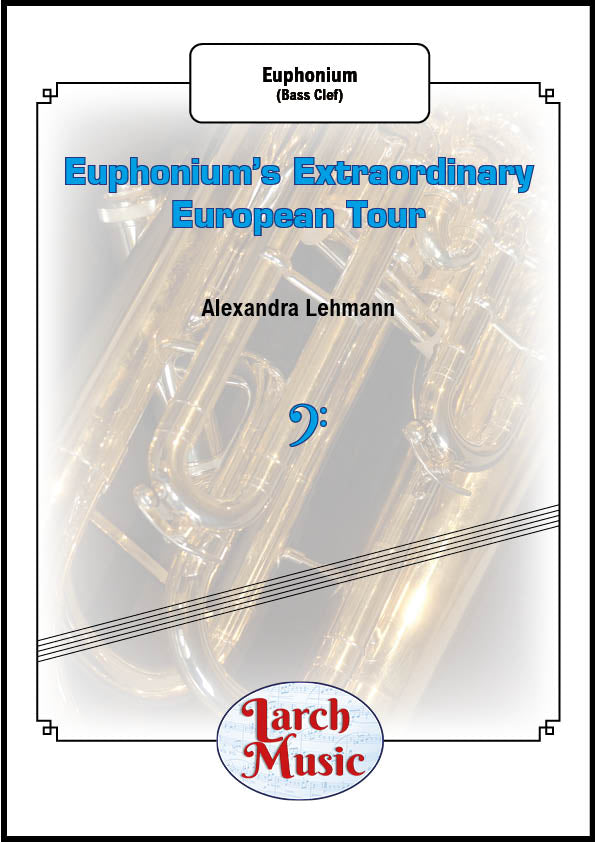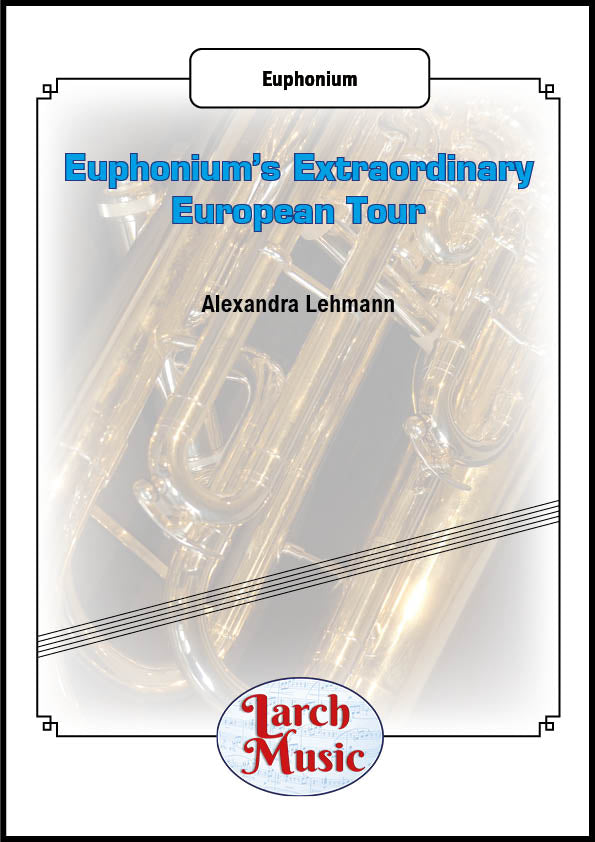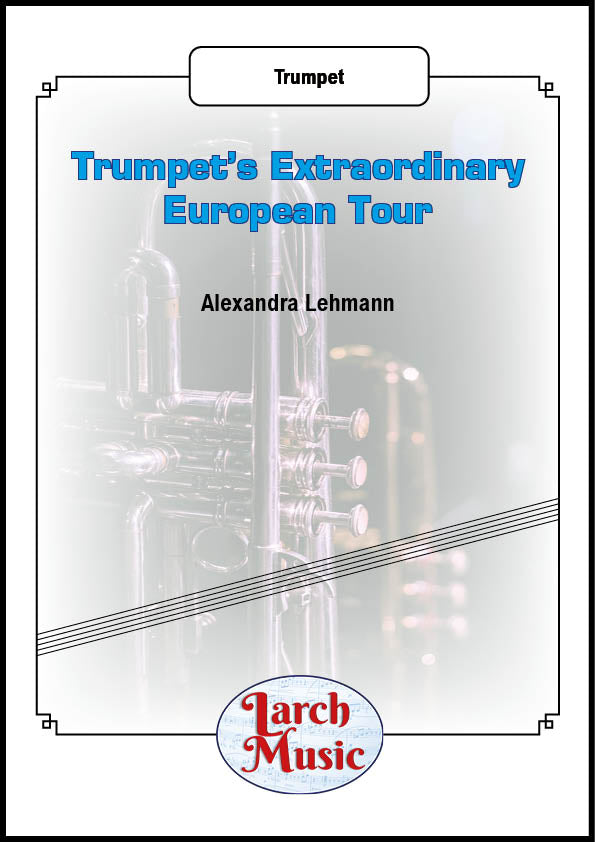Results
-
 £89.95
£89.95Diversions for Brass Band, Op.97 (Brass Band - Score and Parts)
This work was commissioned in1985 by Skellerup, Christchurch, New ZealandMovements:Allegro VivaceAndante Con Moto Molto ExpressivoAllegro VivaceDerek Bourgeois wrote Diversions in the summer of 1985 to a commissioned from the Skellerup Brass Band.Bourgeois previous test piece, Blitz, was aggressive and forceful, therefore the composer decided to write a work of a completely different character, which although technically very demanding, is light-hearted in style, and easy on the ear, as the title suggests.The first and third movements share the same tempo, but are rather different in character. The first movement is a sonata allegro contrasting two main themes. The first is bold and jaunty and is heavily scored, the second announced by the solo horn is more lyrical in character. The development section and recapitulation are merged into a continuous interplay of the two themes.The second movement is an expressive andante in free rondo form. It is lightly scored for the most part with a lot of solo passages that make demands on the musicianship of the players and conductor alike. The very simplicity of its textures and the breadth of its melodic writing demand firm control of vibrato, phrasing and rubato.The brief finale is nothing short of a romp. Its ternary structure is highly rhythmic in character and only rarely do the performers enjoy the luxury of two consecutive bars in the same time signature!Duration: 11.00
Estimated dispatch 7-14 working days
-
 £45.00
£45.00Bathgate Hills Trilogy - Andrew Duncan
Composed by Andrew Duncan and written for the West Lothian Schools Band, A Bathgate Hills Trilogy is in three movements, each one dedicated to and representing a different hill.Comments from the composer:Movement 1 - Dechmont LawThe first movement describes the peculiar events which took place in November 1979 when a forestry worker, Bob Taylor, had a close encounter with an alien spacecraft in Dechmont Woods at the bottom of Dechmont Hill. Bob Taylor's account from the time describes a large sphere like object about twenty feet across which pulled him by the legs towards it, caustic smoke then caused him to pass out. He awoke a short time later in the same spot but the spaceship had gone leaving behind marks in the soil. His story caused a great deal of media interest and a great deal of excitement in the local community.Movement 2 - The Knock HillThe Term 'Knock' is Scottish Gaelic for 'hill' and the Knock Hill is the highest peak in the Bathgate Hills being 305 metres above Sea Level. On a clear day the Knock hill has excellent views of the Bass Rock to the East and the distant hills of Arran to the West as well as of the whole of West Lothian and across the Firth of Forth to Fife and beyond to the North.The second movement is a description of a leisurely walk to the summit of this hill and the enjoyment of a pleasant summer's day spent walking and taking in the beautiful panoramic views. However, as is the case with the Scottish Summer, a change in the weather finds a clear blue sky being replaced with dark rain clouds. The changed weather brings a sudden brief but unwelcome cold downpour of rain, drenching anyone out walking! Finally, the clouds pass and the more pleasant summer weather returns.Movement 3 - Cairnpapple HillCairnpapple Hill is a near neighbour of the Knock Hill. It is almost as high but interest in Cairnpapple Hill lies in the outstanding archaeological monument near the summit, an Iron Age burial chamber. The chamber dates back to 25 years BC and was built by a mysterious people known as the Beaker People (so called because they left behind a number of large earthenware beakers). The mysteries of Cairnpapple Hill have always been a source of fascination for me ever since first visiting the hill as a school child.The third movement describes the lives of the Beaker People. The landscape they would have looked out on would have been mostly dense forest which would have contained many perils including dangerous wolves and bears. Life was harsh and short for the Beaker People and they would always have been close to danger and to death. The average life expectancy for the Beaker People was only 31 years of age. The summit of the hill would have been clear of forest and would have afforded the Beaker People some protection as they could see all around the near countryside enabling them to keep a watchful lookout for their enemies - both animal and human!
In Stock: Estimated dispatch 3-5 working days
-
 £9.95
£9.95Euphonium's Extraordinary European Tour - Solo Euphonium (Bass Clef) - LM171
COMPOSER: Alexandra LehmannEuphonium's Extraordinary European TourThe year 2020 will be infamously recorded as a time when musicians had to lead a solitary life, which is incompatible with musical activity.Furthermore, I wanted to offer an experience of travelling in Europe through music.There is a wealth of historical, and traditional European monophonic music.Hence, the Tour is based around the 14th-15th centuries whenEuphoniumencounters different musical cultures.The Tour is dedicated to my father, mother, brother, and sister;Jean-Pierre, Francoise, Fabrice, and Mahaut Lehmann;with whom I was fortunate to travel in my youth.CONTENTS1. Ostentatious OvertureEuphoniumis at the French palace of Versailles with all itspomp, splendour, and magnificence.2. Mystical MinnesangerEuphoniumhas travelled to the Holy Roman Empire, where he isperforming an ode to a Germanic Knight.3. Andalusian NightsThe Caliphate of Cordoba was a mixing-pot of Islamicand Judaic music. What is fascinating is that many of the ideas aroundperformance; modes at certain times of the day, improvisation into metred,faster sections; go back to the Indian subcontinent and even furtherback into Ancient Greece.Euphonium is chanting for theCaliphate on a warm summer's evening.4. Tarantella of the TagliatelleI don't know if the Medici family ate tagliatelle,but if they did, this joyful and lively tarantella is whatEuphonium would have played.5. Terrifying TropakA complete change of mood.Euphonium is playing for a swashbucklingperformance of Ukrainian Cossacks, with leaps, stamps, and twirls.6. Sami Herding SongIn the Arctic Norwegian north,Euphonium is with the Sami calling theirherd of reindeers with vocalisations that echo in the icy distance.7. Highland FlingEuphoniumis in Scotland taking part in the Highland Games.Female dancers perform athletic jumps.8. Royal Festive FanfareEuphoniumfinishes his European Tour at Windsor Castle, England.Like the natural trumpet (played at the time), the lower range is based on the first notes of the harmonic scale and announce the entry of the royal family.
In Stock: Estimated dispatch 3-5 working days
-
 £9.95
£9.95Euphonium's Extraordinary European Tour - Solo Euphonium (Treble Clef) - LM168
COMPOSER: Alexandra LehmannEuphonium's Extraordinary European TourThe year 2020 will be infamously recorded as a time when musicians had to lead a solitary life, which is incompatible with musical activity.Furthermore, I wanted to offer an experience of travelling in Europe through music.There is a wealth of historical, and traditional European monophonic music.Hence, the Tour is based around the 14th-15th centuries whenEuphoniumencounters different musical cultures.The Tour is dedicated to my father, mother, brother, and sister;Jean-Pierre, Francoise, Fabrice, and Mahaut Lehmann;with whom I was fortunate to travel in my youth.CONTENTS1. Ostentatious OvertureEuphoniumis at the French palace of Versailles with all itspomp, splendour, and magnificence.2. Mystical MinnesangerEuphoniumhas travelled to the Holy Roman Empire, where he isperforming an ode to a Germanic Knight.3. Andalusian NightsThe Caliphate of Cordoba was a mixing-pot of Islamicand Judaic music. What is fascinating is that many of the ideas aroundperformance; modes at certain times of the day, improvisation into metred,faster sections; go back to the Indian subcontinent and even furtherback into Ancient Greece.Euphonium is chanting for theCaliphate on a warm summer's evening.4. Tarantella of the TagliatelleI don't know if the Medici family ate tagliatelle,but if they did, this joyful and lively tarantella is whatEuphonium would have played.5. Terrifying TropakA complete change of mood.Euphonium is playing for a swashbucklingperformance of Ukrainian Cossacks, with leaps, stamps, and twirls.6. Sami Herding SongIn the Arctic Norwegian north,Euphonium is with the Sami calling theirherd of reindeers with vocalisations that echo in the icy distance.7. Highland FlingEuphoniumis in Scotland taking part in the Highland Games.Female dancers perform athletic jumps.8. Royal Festive FanfareEuphoniumfinishes his European Tour at Windsor Castle, England.Like the natural trumpet (played at the time), the lower range is based on the first notes of the harmonic scale and announce the entry of the royal family.
In Stock: Estimated dispatch 3-5 working days
-
 £9.95
£9.95Trumpet's Extraordinary European Tour - Solo Trumpet - LM186
COMPOSER: Alexandra LehmannTrumpet's Extraordinary European TourThe year 2020 will be infamously recorded as a time when musicians had to lead a solitary life, which is incompatible with musical activity.Furthermore, I wanted to offer an experience of travelling in Europe through music.There is a wealth of historical, and traditional European monophonic music.Hence, the Tour is based around the 14th-15th centuries whenEuphoniumencounters different musical cultures.The Tour is dedicated to my father, mother, brother, and sister;Jean-Pierre, Francoise, Fabrice, and Mahaut Lehmann;with whom I was fortunate to travel in my youth.CONTENTS1. Ostentatious OvertureTrumpet is at the French palace of Versailles with all itspomp, splendour, and magnificence.2. Mystical MinnesangerTrumpethas travelled to the Holy Roman Empire, where he isperforming an ode to a Germanic Knight.3. Andalusian NightsThe Caliphate of Cordoba was a mixing-pot of Islamicand Judaic music. What is fascinating is that many of the ideas aroundperformance; modes at certain times of the day, improvisation into metred,faster sections; go back to the Indian subcontinent and even furtherback into Ancient Greece.Trumpetis chanting for theCaliphate on a warm summer's evening.4. Tarantella of the TagliatelleI don't know if the Medici family ate tagliatelle,but if they did, this joyful and lively tarantella is whatTrumpet would have played.5. Terrifying TropakA complete change of mood.Trumpet is playing for a swashbucklingperformance of Ukrainian Cossacks, with leaps, stamps, and twirls.6. Sami Herding SongIn the Arctic Norwegian north,Trumpet is with the Sami calling theirherd of reindeers with vocalisations that echo in the icy distance.7. Highland FlingTrumpetis in Scotland taking part in the Highland Games.Female dancers perform athletic jumps.8. Royal Festive FanfareTrumpetfinishes his European Tour at Windsor Castle, England.Like the natural trumpet (played at the time), the lower range is based on the first notes of the harmonic scale and announce the entry of the royal family.
In Stock: Estimated dispatch 3-5 working days
-
 £35.00
£35.00strange geometry
Descriptionstrange geometrywas commissioned by Morgan Griffiths and the Hammonds Saltaire Band for their performance at the Brass in Concert Championships of 2015.As a bit of a space/sci-fi geek, as well as a musician, two events during the summer of 2015 had a particular effect on me. The first was the tragic early death in a plane crash of the famous film composer James Horner. Horner's music, particularly in films like 'Star Trek II: The Wrath of Khan', 'Avatar', 'Apollo 13' and even his debut in Roger Corman's 1980 budget film 'Battle Beyond the Stars', defined for a generation the sound of sci-fi at the cinema. Along with John Williams he created the vocabulary for those who wish to express other-worldly wonder in music and his inventive talent will be much missed in an industry where originality has become something of a dirty word in recent years.The second event was the epic flyby of Pluto by the NASA New Horizons spacecraft. There are many reasons to find this mission inspiring - for example, the scientists and engineers behind it created a craft that has travelled at 37,000 mph for nine years and three billion miles to arrive within seventy-two seconds of the predicted time for the flyby. That they achieved this with such accuracy is an outstanding tribute to humanity's ingenuity and insatiable curiosity. However, the most exciting aspect of the mission was the clear, high resolution pictures of this unthinkably remote and inhospitable world beamed back to mission control. The best previous image of Pluto was an indistinct fuzzy blob - suddenly we could see mountains made of ice, glaciers of methane and carbon monoxide and nitrogen fog - features previously unimagined on a world thought to be a slightly dull ball of cold rock. The BBC's venerable astronomy programme 'The Sky at Night' waxed lyrical about these newly discovered features, referring to "the surprising discoveries of mountains and strange geometry on the surface of this cold distant world".I like to think that Horner would have been as inspired as I have been by this real-life science story, and this piece uses some of the vocabulary of the sci-fi movie soundtrack in a tribute to the memory of a great musician and to the inspirational geeks at NASA who have boldly taken us where no-one has gone before.Note: This work comes with a B4 portrait score. Listen to a preview and follow the music below!
Estimated dispatch 7-14 working days
-
£86.00
Minnen fran Holmen - Jerker Johansson
The first theme played by the solo clarinet was written by Jerker Johansson the summer 1997, when he was composing in Swedish folk music style for an intended radio programme in which his father should participate reading poems in local dialect. Unfortunately, the project was discontinued. In the spring 2015 Mr. Johansson however started to work on the theme again, this time adding a song theme of broader character. Holmen is the name of the homestead where Mr. Johansson's father Arne grew up. It is beautifully located in the parish of Skarv, situated east of Skara, one of the oldest towns in Sweden. At Holmen, the composer spent his childhood summers and his recollections are filled with many bright moments and happy memories. The piece was premiered May 22, 2015 by the Goteborg Wind Orchestra conducted by the composer.
Estimated dispatch 7-14 working days
-
 £109.99
£109.99Nordic Moods - Tom Brevik
The composer:1st movement: Reflections by the Fjord.Overlooking one of the mighty fjords of Norway, my mind and thoughts are with an old religious Norwegian folk-tune, with words by the famous parson Peter Dass.The majestic fanfare-likeopening reflects the power of God our Father, the choral itself heard for the first time on flugelhorn. The choral is repeated a few times, separated only by some short variations. The movement ends in thriumph, with fanfares and the choral broughttogether.2nd movement: Reflections in the Old Church.In this movement my associations of a summer day, finding myself alone in an old deserted stone church. From the old walls I hear folk songs, perhaps like the ones sung in the church bypoor fishermen and farmers in days gone by. Suddenly the light from the sun breakes through the small circular window above the altar, and a lovely melody is heard, before the original figures take us to the end of the movement.3rd movement:Festive Reflections.Any festive occasion can be reflected in this movement. from the bonfire at midsummer-night to the children celebrating the return of the sun in the northern part of Norway. from the traditional sleigh-riding at Christmas tothe Celebrations of the National Day on the 17th of May each year.
Estimated dispatch 5-14 working days
-
 £115.60
£115.60Minnen fran Holmen - Jerker Johansson
The first theme was written the summer 1997 when Jerker Johansson was composing in Swedish folk music style for an intended radio programme in which his father should participate reading poems in local dialect. Unfortunately, the project was discontinued. In the spring 2015 Mr. Johansson however started to work on the theme again, this time adding a song theme of broader character. Holmen is the name of the homestead where Mr. Johansson's father Arne grew up. It is beautifully located in the parish of Skarv, situated east of Skara, one of the oldest towns in Sweden. At Holmen, the composer spent his childhood summers and his recollections are filled with many bright moments andhappy memories. The piece was premiered May 22, 2015 by the Goteborg Wind Orchestra conducted by the composer.
Estimated dispatch 5-14 working days
-
£54.99
Studio-Pop - Kees Vlak
Studio-Pop consists of five movements. The first movement, entitled Marching on a String, is an energetic rock march in a modern rhythm. Next, the charming Dreaming of Summer has been composed in three-four time - which is quite unusual in modern pop music. The inspiration for the third movement, Chicken-Charley was a youngman selling chicken legs from a stall. His supple, dancing movements can be recognised in the music. The fourth movement, Candlelight is a modern, attractive ballad. Finally, Discoteca takes us along on a night visit to a Spanish discotheque. The typically Spanish chords and the stirring, high-spirited rhythm provide an exuberant closing to Studio-Pop.
Estimated dispatch 5-14 working days



